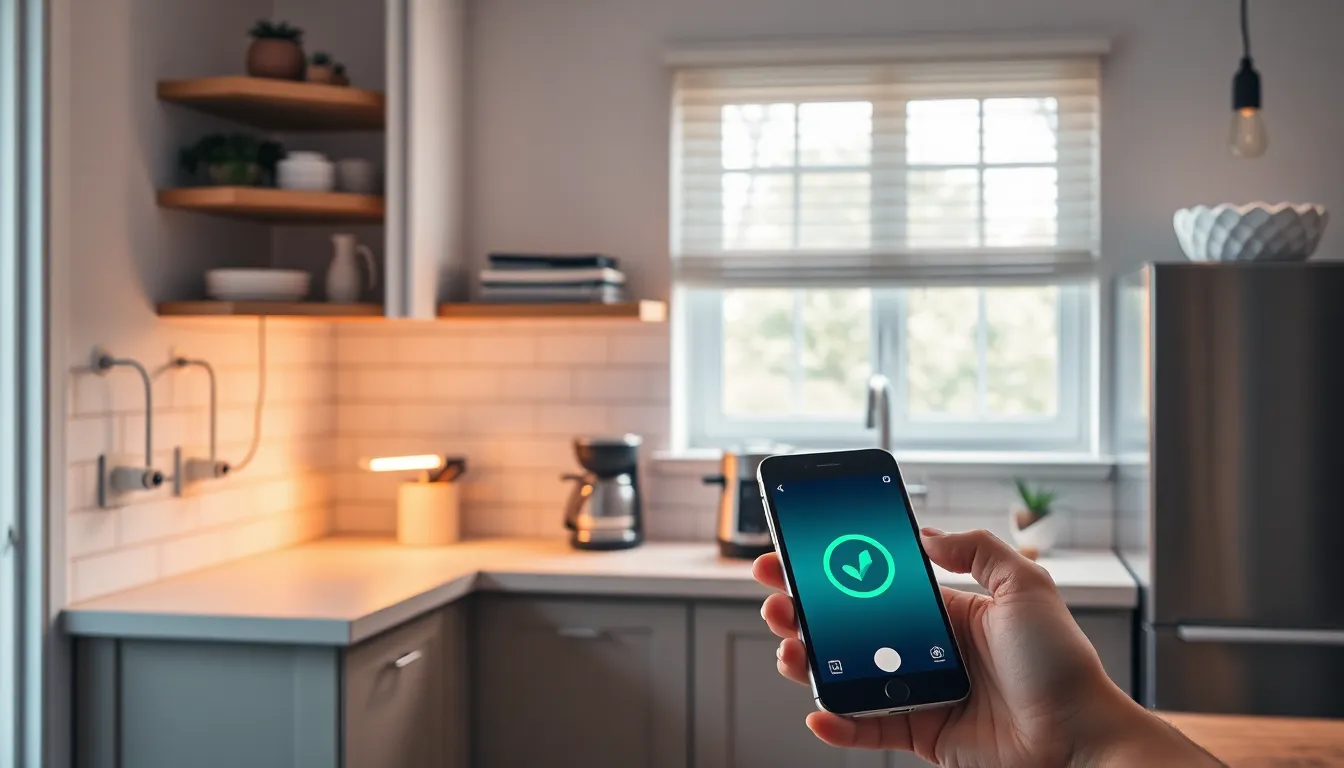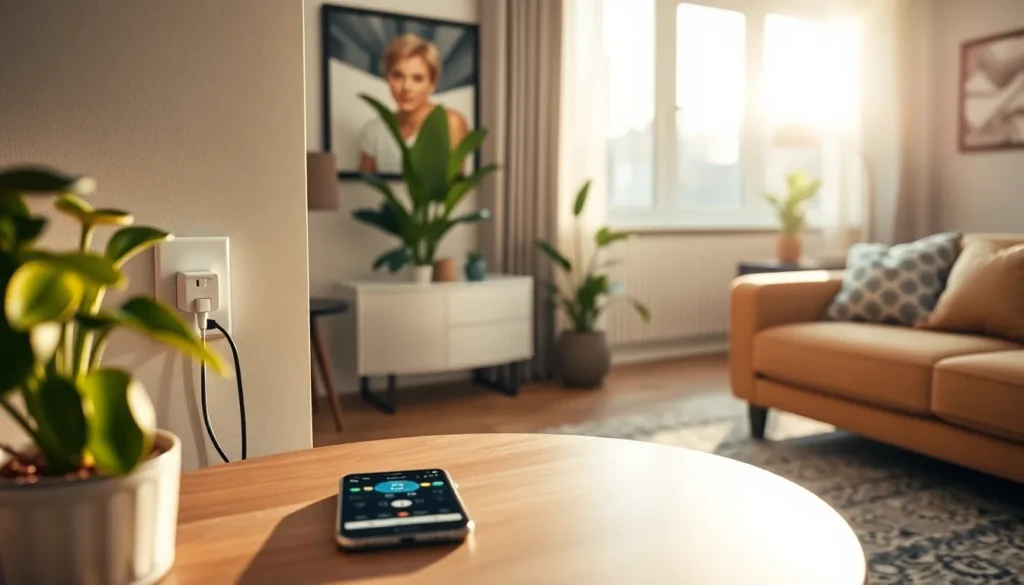In a world where even your toaster can be smarter than you, smart plugs are the unsung heroes of home automation. These nifty gadgets turn any ordinary appliance into a tech-savvy powerhouse, allowing users to control everything from lamps to coffee makers with a simple tap on their phone. Imagine waking up to the scent of freshly brewed coffee without even getting out of bed—now that’s a morning win!
But smart plugs aren’t just about convenience; they’re also about saving energy and cutting down on those pesky electricity bills. With features like scheduling and remote control, they help users manage their energy consumption like a pro. So why not join the smart revolution? It’s time to plug into the future and let your home do the heavy lifting while you sit back and enjoy the perks of modern living.
Table of Contents
ToggleOverview of Smart Plugs
Smart plugs revolutionize home automation by enabling traditional devices to connect to the internet. These compact devices plug into standard outlets, transforming any appliance into a Wi-Fi-enabled gadget. Users gain the ability to control their home devices remotely via smartphones or smart assistants.
Scheduling features allow users to set specific times for appliances to turn on or off. For instance, brewing coffee automatically at 7 AM becomes possible. Energy monitoring functions help track consumption, leading to significant savings on electricity bills. Users might find that managing energy usage reduces costs and promotes sustainability.
Compatibility with voice platforms, like Amazon Alexa and Google Assistant, adds an element of convenience. Users can command their devices hands-free, enhancing the smart home experience. Customizable settings allow for tailored usage patterns based on individual preferences.
Smart plugs come equipped with safety features, such as automatic shut-off when appliances overheat. This aspect significantly reduces fire risks, offering peace of mind. Energy-saving modes enable users to optimize their appliance efficiency and further reduce consumption.
Selecting smart plugs involves looking for reliable brands with strong user ratings. Popular options often feature user-friendly apps and seamless integration with existing setups. Investing in smart plugs generally results in enhanced control, increased energy efficiency, and a more enjoyable living environment.
Advantages of Smart Plugs

Smart plugs offer significant benefits, enhancing both energy management and convenience in daily life.
Energy Efficiency
Energy efficiency stands out as a primary advantage of smart plugs. Users can schedule appliances to run during off-peak hours, which lowers electricity costs. They monitor energy consumption, providing insights that help identify high-use devices. This information allows users to make informed decisions about their usage patterns. Studies suggest that incorporating smart plugs can lead to energy savings of up to 30%. Many models now include features for automatic shut-off, preventing energy waste when devices remain in standby mode.
Convenience and Automation
Convenience is another key advantage. Smart plugs enable users to control devices from anywhere via a smartphone app. Remote management means that users can turn on appliances before arriving home. Integration with voice assistants streamlines control, turning on lights or coffee makers with simple commands. Scheduling features offer flexibility, allowing devices to operate at set times. For instance, a user can wake up to a pre-brewed coffee or lights that gradually brighten in the morning. Automation enhances daily routines, making task management easier and transforming ordinary living into a smarter experience.
Types of Smart Plugs
Smart plugs come in various types, each designed to cater to specific user needs. Understanding these options helps in selecting the right one for home automation.
Wi-Fi Smart Plugs
Wi-Fi smart plugs connect to home networks without additional hubs. Users control appliances via smartphone apps from anywhere, offering flexibility. Voice assistants like Amazon Alexa and Google Assistant enhance user experience, enabling hands-free commands. Wi-Fi smart plugs often support scheduling, allowing devices to operate during specific times, optimizing energy consumption. Some models feature energy monitoring, providing insights into usage patterns for better management. A significant advantage includes easy integration with existing smart home systems, making them highly popular among tech-savvy individuals.
Bluetooth Smart Plugs
Bluetooth smart plugs function by establishing direct connections with smartphones. These plugs operate within short ranges, making them suitable for local control without internet access. Users enjoy seamless operation without needing a router or subscription. While Bluetooth offers quick setup and lower cost, it typically lacks the extensive range of Wi-Fi plugs. Scheduling and energy monitoring features may be limited compared to Wi-Fi counterparts, yet they still provide basic automation capabilities. Bluetooth smart plugs appeal to users seeking straightforward solutions for simpler smart home setups.
Compatibility with Smart Home Devices
Smart plugs integrate seamlessly with a variety of smart home devices, enhancing overall functionality. Wi-Fi smart plugs connect directly to home networks, facilitating remote access via mobile applications. This allows users to manage connected appliances from any location with an internet connection.
Bluetooth smart plugs offer an alternative by connecting directly to smartphones within a limited range, making them suitable for local control without requiring internet access. They may lack some advanced features but suit users looking for straightforward automation.
Integration with major voice platforms, such as Amazon Alexa and Google Assistant, elevates the convenience factor. Voice commands enable users to control smart plugs effortlessly, providing hands-free operation for everyday tasks. Most smart plugs also support integration with other smart home ecosystems, establishing connections with devices like smart lights, cameras, and thermostats.
Energy monitoring capabilities allow users to track power consumption of connected devices. Such insights enable users to identify which appliances consume the most energy, leading to informed decisions about usage. Further, scheduling features let users automate device operation based on their routines, promoting energy efficiency and convenience.
When selecting smart plugs, compatibility with existing home systems becomes crucial. Checking manufacturer specifications ensures the right fit with devices already in place. Ultimately, users achieve a cohesive smart home environment by prioritizing compatible devices, resulting in streamlined control and improved energy management.
Popular Brands and Models
Numerous brands excel in the smart plug market, showcasing a variety of models that cater to different needs. Trusted brands include TP-Link, Wemo, and Amazon.
Features to Look For
Smart plugs vary by features. Compatibility with major voice assistants like Amazon Alexa and Google Assistant stands out as essential. Energy monitoring capabilities help track electricity usage, enabling informed decisions. Users find scheduling functions beneficial, as they allow appliances to operate at set times, enhancing convenience. Remote access is vital, allowing control from anywhere as long as there’s internet. Additionally, safety features such as automatic shut-off promote peace of mind, reducing potential fire risks. Users should assess these attributes to ensure they select the best smart plug model for their home automation needs.
Price Comparison
Price ranges for smart plugs can vary significantly based on features and brand. Basic models typically start around $15, while advanced options can exceed $50. TP-Link Kasa plugs offer effective performance around $20, fitting well within budget-conscious users’ needs. Wemo models provide additional features at about $30. Amazon Smart Plug remains a popular choice, priced around $25, integrating easily with Amazon Echo devices. Overall, spending typically correlates with added functionalities, emphasizing the need for consumers to evaluate their specific requirements before purchasing.
Smart plugs offer a simple yet powerful way to enhance home automation. By transforming traditional appliances into smart devices users gain unprecedented control over their environment. The convenience of scheduling and remote management not only improves daily routines but also contributes to significant energy savings.
With various options available users can find smart plugs that fit their specific needs. Whether opting for Wi-Fi or Bluetooth models the benefits of energy monitoring and voice assistant compatibility make these devices a worthy investment. By choosing reliable brands and understanding features users can create a more efficient and enjoyable home experience. Embracing smart technology is a step toward a smarter and more sustainable lifestyle.













